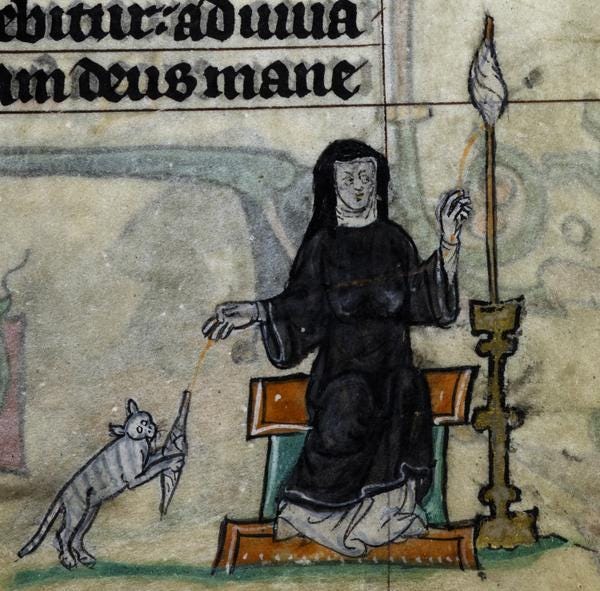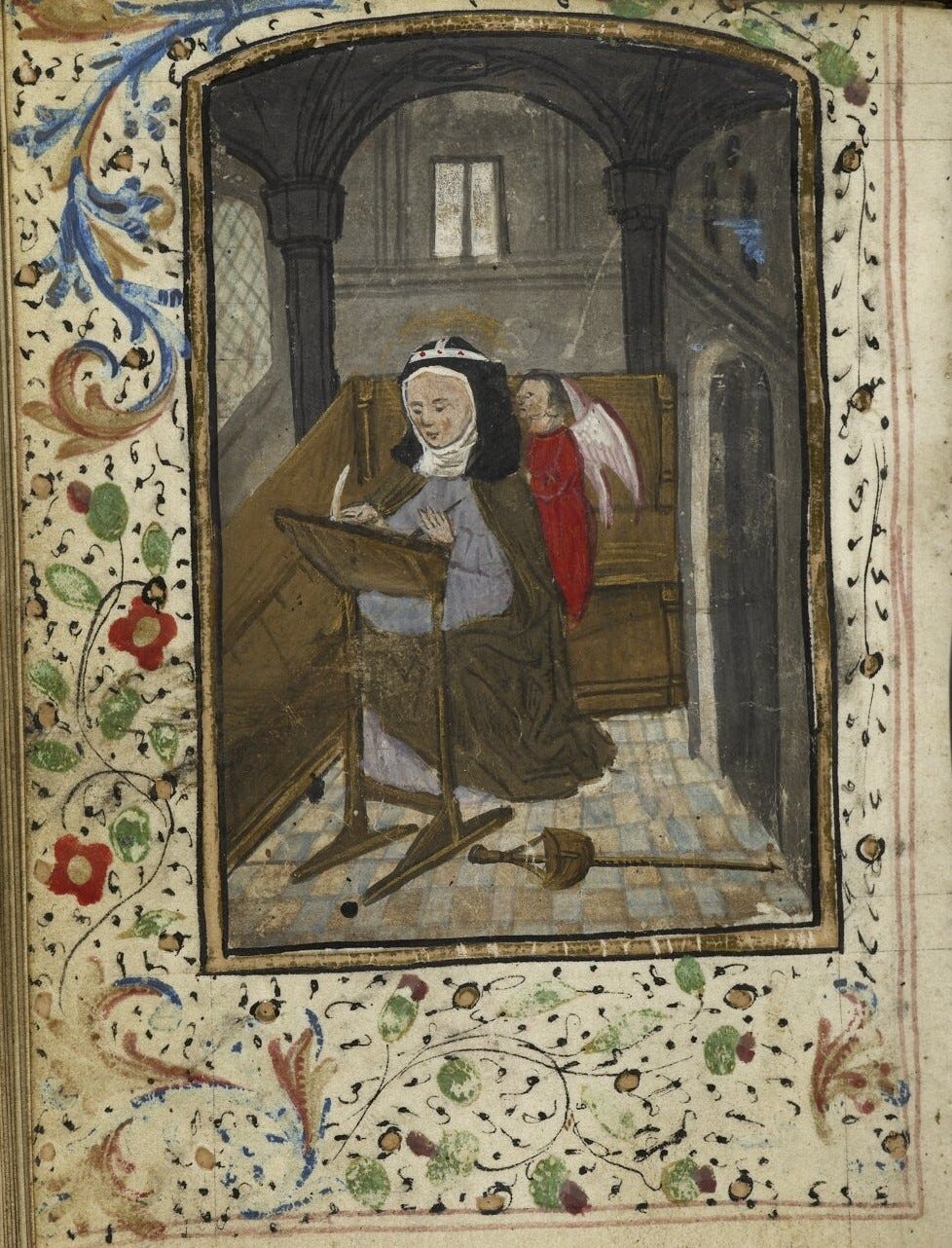1. In his book ‘Western Mysticism’, Dom Cuthbert Butler – an Irish Benedictine monk and ecclesiastic historian - defined mystic experience as “the experimental perception of God’s presence and being.”
2. I’m not sure how useful a definition this is, but I'm thrilled and drawn towards the possibility of perception itself as something experimental. For perception to be experimental requires it to contain the possibility that such experiment may fail. It’s true that so much of my perceiving can feel like a failed experiment, and I catch myself blinking in disbelief, caught in a state of bewildered non-understanding. But like all negatives, failure has its uses. I’m interested in failure as a place from which to (re)start, and I am quite committed to the honourable nature of attempt. Mysticism is like failure in that it works from a place of negation and causes a rupture within the seam of ordinary time. Surely, every martyred saint knows that failure is the fertile moment of and for revelation.
3. I am drawn toward Mysticism and its accompanying ruptures as a mode of experiential excess – even if paradoxically, it’s a mode of excess often accessed through asceticism. I’ve always been drawn to excess, but have always wanted to find a way to experience excess that causes no harm to myself, to others, or to the earth. This manifests as an endless appeal for MORE LIFE – it propels me forward through the doomiest dread-filled moments of stasis. A greediness to live, in spite of all acedia and melancholy, a desire that persists, determined to find ways out of stasis and into divine motion.
4. In my life (both my lived life and my reading life) I have come to understand mysticism as an unmediated personal experience of the divine / God / the unknown. Words like divine and God can be challenging, and obviously as a person of mystic temperament I cannot define what I mean by God, only that for lack of better language, I find the term useful as a shorthand or as a vague and intentional provocateur, depending on who I’m with or how deranged I’m feeling. When I say God I am gesturing towards an experience, a force, or a state to be entered rather than any kind of specific religious entity or anything else more noun-like.
5. I need there to be a force in the world that precedes, imbues, animates and goes beyond the material. I think without the tension of this faith / doubt dialectic I would find it difficult to keep living. Aquinas illustrates: the presence of the immoveable which animates and moves through us all.
6. As has been the case with a certain line of thinkers going to back to at least the Neo-Platonists (and realistically, probably earlier) my line of thought follows the Via Negativa, aka negative theology, aka apophasis which is a theological philosophy / practice that takes the unknown as its defining feature. Ie: we cannot say what God is, so we can only – again, paradoxically – get close to understanding what God is by defining what God is not.
This theory first appeared (as far as I know) during the 6th Century, in a Mystical Corpus of texts attributed to a certain Dionysius the Areopagite, but he was dead about four centuries before the texts appeared, and so to this day, the true author of the pseudonymous texts remains a mystery. In his Mystical Corpus, this Pseudo-Dionysius suggests a compelling theory of negative theology; that God can only ever be understood through apophasis, which is to say, that within the limits of the language available to us, God cannot be understood at all. His Via Negativa was a way to approach God’s unknowability – we can only arrive somewhere close to understanding by accepting that we can never know. Through the Via Negativa, he suggests, we arrive not at a state of ignorance, but at a state of knowing undone. By keeping his authorial identity a secret, the Pseudo-Dionysius seems to be playing tricks with us, practically demonstrating his own theory and leading us down an ever deepening trail of mystery. After all our speaking, reading, and comprehending ceases, he suggests, a divine darkness of silence and unknowing follows. This divine darkness is the closest we come to a mystical state. Or in one translation, the one I like best, he calls it divine gloom,
7. Divine Gloom is similar to what Simone Weil would later call ‘decreation’ (undoing the creature in us !! Getting the self out of the way !!) or what Fanny Howe (the main character of my PhD) would call ‘bewilderment’ or what the anonymous 15th Century author of the greatest titled mystical treatise of all time, 'THE CLOUD OF UNKNOWING’ would refer to in his Middle English translation of Pseudo-Dionysius as ‘Hid Divinitie.’
I am interested in the mystical state as being beyond language when paradoxically, the history of mysticism is inextricable from the history of writing, specifically autobiographical writing. The first book written by a woman in English was Julian Of Norwich’s spiritual autobiography ‘Revelations of Diving Love’, wherein she recounts her mystical ‘shewings.’ The female ‘I’ in the English writing world was borne (imo, and probably historically accurately) out of divine gloom. Centuries later Wittgenstein (another darling mystic!) would tell us that the inexpressible is contained, paradoxically, within the expressed. The space between language and inexpressibility is what animates me. To me, this makes writing the most hopeful mode of excess I can manifest in my life.
8. Simon Critchley writes (in, I believe, an excerpt from his upcoming book ‘On Mysticism’, which I’m simply dying to read):
The I finds its voice and itself through its relation to the otherness of God. Maybe this is why autobiographies without God are often so dull (one thinks of the contemporary tyranny of memoir) unless they stage autobiography as the self ’s conflictual, dialectical relation to itself, the division within the self that still inhabits the form of the religious narrative.
9. The last time I was in Athens I was working on very early notes for the novel I am still slowly tipping away at and I passed some graffiti on a wall that just said: death, drugs and beauty. It made me laugh but also seemed like a fortuitous sign to keep going on what I was writing.
10. Before I discovered the freedom that comes with literally making things up I thought I was writing a memoir. But trying to write from memory about a time that includes huge immoveable blank spots became a kind of apophasis in itself. I cannot say what happened because I don’t know what happened, and the only other person who was there is now dead. All I have are the words that inadequately try to put a shape on the nebulous. A failure, then. Out of failure, the most divine gloom. I cannot change the things that happened in my life, but something moves me and I can write quite freely, revelatory, into absence.





